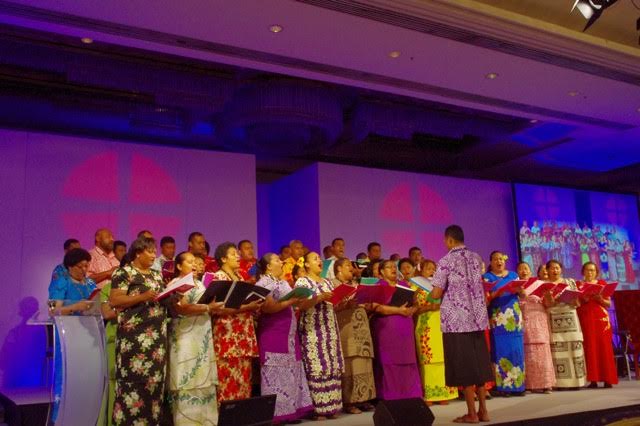Methodist Church may get bishops for the first time in UK in mutual recognition pact with Anglicans

Methodists and Anglicans are embarking on a process of consultation of towards historic proposals that could recognise the ministers, priests and bishops of both churches for the first time since they split in the late 18th century.
And for the first time ever, the proposals, if agreed, would give Methodists in the UK some bishop of their own.
The person elected annually as president as the Methodist Conference would take the title 'President-Bishop' instead of just 'president' and would be ordained by at least three bishops including bishops from the Church of England.
The Methodist church in the United States already has bishops but the church in the UK has never adapted to the episcopal model before.
A report being disussed at the Methodist Conference in Birmingham this weeked says that the main proposals, if implemented, 'will enable an interchange of presbyteral ministries between our churches that has not been possible since the parting of the ways between Anglicans and Methodists in the late eighteenth century.'
If accepted, 'the proposals made here will enable a new depth of communion between our churches and enhance our common mission, to the glory of God,' the report says.
The report says the Methodist Church could now be ready in the UK for the first time ever 'to share the ministry of the historic episcopate as a sign of the apostolicity of the Church of God.'
Mission and Ministry in Covenant is also to be debated at the General Synod of the Church of England in York.
The new proposals 'will enable a new depth of communion between the two Churches and would make presbyters from each Church eligible to serve in the other,' the report says. 'Together these developments will enhance the Churches' common mission to the glory of God.'
The office of a President-Bishop would express the Conference's ministry of oversight 'in a personal form', the report says.
It states: 'We affirm that there already exists a basis for agreement on the principles of episcopal oversight as a visible sign and instrument of the communion of the Church in time and space.'
This joint report represents a major step of growth in the relationship between the two Churches, building on the theology of the Anglican-Methodist Covenant, signed in 2003.
The provision for bishops in the Methodist Church would be a hugely significant development.
The report states: 'Upon election, the President-bishop would be ordained to the office of bishop by bishops of partner churches whose orders are recognised by both churches.'
This follows an ancient requirement, stemming from the Council of Nicaea, that a new bishop is ordained by at least three bishops.
The President-bishop would then be required without exception to preside at all subsequent ordination services in the Methodist Church and after leaving office, and will continue to exercise a permanent episcopal ministry in the Methodist Church.
And this would even include ordaining clergy in the Church of England.
This means that although the Methodist Church would start with one bishop, over the years they would accumulate.
Because although the office of conference president rotates annually, the holder would remain a bishop even after they had rotated out of office.
Further, it could even lead to demands in future that Methodist bishops be considered for inclusion among the 26 Church of England bishops in the House of Lords, should those bishops themselves survive future changes in the secular government administration at Downing Street.
Canon Gareth Powell, secretary of the Methodist Conference, said: 'Methodists and Anglicans urgently need a set of proposals to enable the two Churches to move towards fuller communion, sharing more profoundly in mission and ministry. The model of a President-Bishop in these proposals, upholding as it does the centrality of the Conference, is a deeply Methodist way for John Wesley's people to engage at every level with the Church of England in mutual planning for pastoral oversight and Christian mission.'
Dr Christopher Cocksworth, Bishop of Coventry and chair of the Church of England's Faith and Order Commission, said: 'I am grateful to the joint working group for their careful but imaginative work on bringing forward a workable plan for enabling interchangeability of priestly ministry in our two Churches. The solution is built on the centrality of the historic episcopate and the Bishop as minister of ordination. The scheme as proposed will enable dioceses, districts and local churches to engage in creative pastoral planning for the good of the mission of God in this country.'












